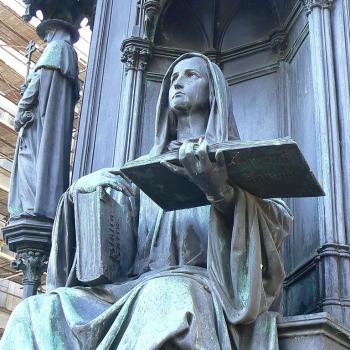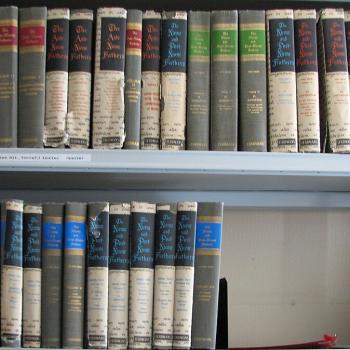
Source: Unknown / MaxPixel
There are many ways Christians find themselves engaging and reflecting upon the nature of the Christian faith in relation to other religions. Christian theological reflection on the status of non-Christian religion is underscored by many different theologies of religion, that is, many different theological interpretations which explain not only why other religions exist, but also, what Christians can think about their status in relation to the Christian faith.[1] Likewise, Christians, seeking to understand the freedom we all should have to believe and follow the religion of our choice, discuss and defend religious liberty: a Christian does not need a particular theology of religion in order to promote religious freedom, which is why it is a separate, though possibly related, discipline. Then, there is the field of Comparative Religion, where scholars look at and examine the similarities and differences of various religious traditions. For Christians who are interested in comparative religion, inter-religious dialogue is invaluable, because it brings them in contact with adherents of other faiths, allowing them to learn what others believe and why. Finally, there is the field of Comparative Theology, where Christian scholars not only listen and learn about what others believe, they do so with the intent to learn from others so that they can then reflect upon what they learn and engage it in their own theological tradition.
Comparative Theology can seem to be a radical response to other religious traditions. Why would someone look to what others have to say and let their own theological reflection be transformed as a result of what they learn? Many questions are often asked by those who engage Comparative Theology that a Comparative Theologian is likely to develop their own theology of religion as a means of defending and justifying their engagement with non-Christian faiths. They might look to the seeds or rays of truth found in other faiths and point out that such truth is meant to have its home with the fullness of the truth found in Christ. Some, like Origen, might compare this to the “spoiling of the Egyptians,”, but others, like Ficino, Steuco, Reuchlin, et. al., might look for a perennial tradition which they believe ties the truths of various religious faiths together as a way to justify exploring the way a particular aspect of the truth is discussed in other faiths, realizing that it is the same truth, but explored in a depth which Christians have yet to explore it. The key is to realize that the exploration and expression of the truth in other religious traditions might hold some connection to the truth within the Christian faith, and so the way religious thinkers in other traditions dealt with problems Christians deal with can and will be able to help Christians engage the issues in a new, indeed, vitalized manner.
Truth does not contradict truth: this is true not only in regards Christian theology with science, but any and every expression of the truth wherever it is found. How it and why it can found can be a theological question, but what one gains from the examination of such truth can and will have a positive effect in theology. This is why one of the greatest examples of Comparative Theology in the history of Christian theology can be seen as being the medieval scholastic enterprise, where Christian theologians, like St. Thomas Aquinas, examined, and learned from pagan philosophers such as Aristotle, Muslim theologians like Ibn-Sina and Jewish theologians like Maimonides. Christian theology has, from the beginning, welcomed input from non-Christian religious thinkers, which is how and why pagan philosophers helped shape the framework in which Christian theology was begun (with St. Clement of Alexandria suggesting God gave philosophy to the pagans as a way to prepare them for the incarnation). [2]
Comparative Theology, to be done right, requires proper examination of the other faith, studying and learning what it actually says, instead of assuming what it says and making arguments based upon such bad assumptions. Obviously, the tools various theologians have had to do this have changed over times. In many earlier eras, theologians had to deal with limited inter-religious resources, and so their work in comparative theology was limited. But even then, where it is found it should not be ignored, so long as the attempt is honest and the theological reflection which comes from it helps deal with a difficult theological question. Learning a little from another tradition might be all one has the time and ability to do, but even a little engagement with the other might be enough to transform theology, while a greater, more significant engagement with the other could, and sometimes does, produce a tremendous work of Christian theology. This can be seen in the way Christians slowly engaged the Platonic tradition: some commentators, like Calcidius or Boethius, gave to Western Christianity a small portion of the Platonic corpus, and yet what they provided established a grand theological view which was incorporated in the theologians of great theologians, such as those associated with the School of Chartres (and later, the Victorines). But, more than the small engagement with Platonic Theology established by such thinkers, the work of Pseudo-Dionysius, by his study, engagement and adaptation of the works of Proclus into a Christian theological synthesis demonstrates the way Comparative Theology has helped shape the development of Christian theology as a whole: for theology after Dionysius has never been the same.
Christian theology has a history of theologians learning from non-Christians, non-Christians who were asking and answering theological questions in relation to their own faith, and applying what they learned in their own theology. Both Origen and St. Jerome sought out Jewish scholars for this reason. St. Thomas Aquinas not only learned some ways to philosophically think about God due to his contact with Islamic thought, he also found notions which he disagreed with, such as found in the writings of Averroes, which suggested avenues of theological reflection that lent to the development of his own theological system. Comparative Theology, therefore, is not only going to look for the truth which can be found discussed in other faiths, but also important or significant theological notions which Christians disagree with, using them as the foundation for deeper theological reflection. Certainly, this could merge with the field of apologetics, though a serious engagement with the faith of others should not end up as a simplistic, triumphalistic analysis of what is wrong with the other, but a discernment with the questions the other raises and the positive theological answer which can be given to such questions. That is, as Aquinas, and other scholastics show us, engaging difficult questions and objections made by others to what we believe should result not in a negative condemnation of the other but a positive assessment of our own belief, enhancing it in the process. Christian theology should not dwell on the negation of the other, though of course it will critically examine what others believe, but rather, on the positive implications of divine revelation, using all the resources possible to examine and elucidate the meaning of the Christian faith and all the implications of the Christian faith for the world.
Comparative Theology, while not new to the history of the Christian faith, has been revitalized in the modern era because of inter-religious dialogue and the field of comparative religious. Due to what has been revealed by these disciplines, Christians are given a better chance to learn from and appreciate what others believe, allowing them to likewise come to see new questions which need to be asked and the kinds of answers possible to such questions. It is quite possible that comparative theology can establish a new kind of scholastic renewal: not, of course, to repeat what Aquinas and other schoolmen said in the past, but rather, to open up Christian theology to questions which need answers in today’s world as well as the kinds of answers which have already been given to them by members of other faith traditions. That is, by this new insight, Christians can and will look at their own faith in a new light, allowing them to reflect with the new wine skins needed for the new wine of today’s world. But to do this properly, Christians must always be careful with what they are doing. They must take care to know and understand the other religious tradition they are engaging, not turning it into a caricature of itself, and that means to be willing to listen and learn from those from other traditions. Then, having done so, they can take what they learned back to their own faith, admit where the source of their reflection comes from (as well as they way they are transforming the nature od what they are engaging by the nature of the engagement), in order to produce new theological insights. It worked for Dionysius. It worked for Aquinas. It worked for Ficino. It can and should work for us today.
[1] For those interested in the way other religions can fit into a theological model, Paul Knitter’s Introducing Theologies of Religion serves as a sound introduction to the topic by showing the way various theologians have seen the way other religions relate or do not relate to the Christian faith.
[2][2] This was also true in regards the development of the religion of Israel. Scholars find in the Tanakh evidence of ideas being borrowed from a wide range of sources including the Canaanites, Egyptians and Persians.
Stay in touch! Like A Little Bit of Nothing on Facebook












